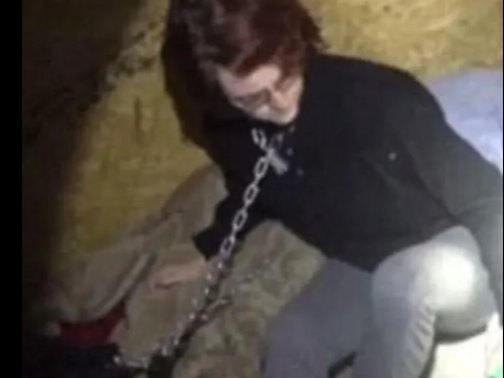Victoria Lea Henneberry, serving a life sentence for the second-degree murder of Loretta Saunders, had been granted 30 days of unescorted leave
Published Jan 11, 2025 • Last updated 0 minutes ago • 5 minute read

The Parole Board of Canada has cancelled unescorted temporary absences for a woman who helped kill a pregnant Inuit student from Labrador just over a decade ago in Halifax and dumped her body beside a highway in a hockey bag.
Victoria Lea Henneberry is serving a life sentence for the second-degree murder of Loretta Saunders in February 2014. The parole board had granted her 30 days of unescorted leave in the fall of 2024 to take “personal development” courses at a halfway house.
Advertisement 2
THIS CONTENT IS RESERVED FOR SUBSCRIBERS
Enjoy the latest local, national and international news.
- Exclusive articles by Conrad Black, Barbara Kay and others. Plus, special edition NP Platformed and First Reading newsletters and virtual events.
- Unlimited online access to National Post and 15 news sites with one account.
- National Post ePaper, an electronic replica of the print edition to view on any device, share and comment on.
- Daily puzzles including the New York Times Crossword.
- Support local journalism.
SUBSCRIBE FOR MORE ARTICLES
Enjoy the latest local, national and international news.
- Exclusive articles by Conrad Black, Barbara Kay and others. Plus, special edition NP Platformed and First Reading newsletters and virtual events.
- Unlimited online access to National Post and 15 news sites with one account.
- National Post ePaper, an electronic replica of the print edition to view on any device, share and comment on.
- Daily puzzles including the New York Times Crossword.
- Support local journalism.
REGISTER / SIGN IN TO UNLOCK MORE ARTICLES
Create an account or sign in to continue with your reading experience.
- Access articles from across Canada with one account.
- Share your thoughts and join the conversation in the comments.
- Enjoy additional articles per month.
- Get email updates from your favourite authors.
THIS ARTICLE IS FREE TO READ REGISTER TO UNLOCK.
Create an account or sign in to continue with your reading experience.
- Access articles from across Canada with one account
- Share your thoughts and join the conversation in the comments
- Enjoy additional articles per month
- Get email updates from your favourite authors
Article content
Henneberry, now 39, and her boyfriend, Blake Leggette, were subletting a room in Saunders’ Halifax apartment when the couple killed the Saint Mary’s University student after she came to collect their rent that they didn’t have.
The parole board revoked Henneberry’s leave because of her behaviour in a decision released Friday.
“You began expressing feeling emotionally overwhelmed. Your expressions began to look like warning signs for more serious concerns as you indicated you did not want to wake up,” the parole board said.
“Concerns also arose with you not following the rules. Despite it being explained to you that you should not access the internet as per the (unescorted temporary absence) rules, you later reluctantly admitted you did so through other residents.”
Recommended from Editorial
-

Killer who left pregnant victim's body on side of road granted unescorted leave for 'personal development'
-

Victoria Henneberry and Blake Leggette plead guilty in murder of Inuit woman Loretta Saunders
Henneberry got others to order items for her from Amazon, including a guitar pic and earrings, said the decision, dated Dec. 24. “You did this despite not being able to bring new items back into the prison with you and despite the express purpose of the (unescorted temporary absences) being for rehabilitative purposes.”
By signing up you consent to receive the above newsletter from Postmedia Network Inc.
Article content
Advertisement 3
Article content
Hennebery “also repeatedly encouraged others to ‘Google’ (her), despite redirection and counselling about this,” said the decision, which notes that her “preoccupation around this appears counter to the rehabilitative purpose” of the unescorted leaves from prison.
“That seems to have contributed to your emotional instability as you became emotional after one resident did look you up and distanced herself from you thereafter.”
Henneberry is a minimum-security prisoner in Ontario. The prison and the halfway house are not identified in the parole board decision.
Henneberry either used a phone at the halfway house or had someone else do it for her, said the decision. “Another resident suggested you had taken the phone from her and were refusing to give it back, which is how the phone came to the attention of a parole officer in the first place.”
Concerning to the parole board was that the phone, found in her roommate’s pillowcase, “had been erased except for a search for Harley Davidson on the web browser. This raises questions about what else you had done with the phone and why you felt the need to hide it.”
Advertisement 4
Article content
Henneberry “initially denied using the phone at all,” but later admitted she had asked “someone else to search things for” her.
Her parole officer noted that Henneberry’s “suicidal ideation came following the concerns being raised about” her cellphone use, a violation of the rules governing unescorted temporary absences.
Henneberry’s parole officer “suggests (the talk of self-harm) could be a manipulation tactic. Regardless, your emotional state was taken seriously and contributed to the suspension of your (unescorted temporary absence) in late November, just a few days before it was set to be complete.”
Henneberry was “dismissive” when confronted about breaking the rules.
The portion of the leave Henneberry did complete was not a “total failure,” said her parole decision. “You did partake in and complete programs specific to your needs. You were viewed as motivated and interested in the programs. You were seen working on program homework throughout your days. Though you were described as pushing for shopping and grocery trips, you ultimately did follow directions that this was not permitted.”
Advertisement 5
Article content
Henneberry got her driver’s licence, “went to the gym a few times and partook in walks around the” halfway house property, said the parole board.
“The (unescorted temporary absence) provided exposure to the community that you have not had in years, and you seemed to do well for a time. Ultimately, you were not able to maintain this positive approach.”
Saunders was 26 when she died. Leggette attacked her from behind on Feb. 13, 2014, when she entered the apartment.
“Your boyfriend strangled the victim, tried to suffocate her with several plastic bags, and hit her head off the floor twice,” said the parole board.
“The victim fought back until he hit her head on the floor, and she stopped moving. He put the victim’s body into a hockey bag, and then cleaned up around the apartment.”
Leggette carried the hockey bag to the victim’s car and placed it in the trunk.
“You both packed some items and left the apartment. You used the victim’s bank card to buy food and supplies. When you drove into New Brunswick, you and your boyfriend dumped the victim’s body, still in the hockey bag, on the side of the highway.”
Advertisement 6
Article content
They were later arrested in Ontario.
Henneberry identifies as Indigenous through her mother’s side of the family.
“You reported your grandfather, who lived in Canada, married an American woman who was Cherokee, although you do not know where they lived or if they ever lived in the United States or a reservation,” said the parole board.
“You did not grow up on a reservation and did not participate in any ceremonies or cultural teachings.”
Henneberry, who “currently practices the Wiccan religion,” was born in Halifax, but mostly raised in Ontario.
“Your mother was involved in criminal activity. When you were four, you were taken into care by the Children’s Aid Society and lived in foster homes until you were 18,” said the parole board.
“Your childhood was described as tumultuous, and your history of behavioural issues started prior to your teenage years. You reported being sexually abused. You reported your mother was a heroin addict who consumed alcohol, and your father smoked marijuana. Your mother passed away in 2010, and you do not have contact with your father, noting he lives in Germany.”
Our website is the place for the latest breaking news, exclusive scoops, longreads and provocative commentary. Please bookmark nationalpost.com and sign up for our daily newsletter, Posted, here.
Article content
.png)
 3 hours ago
12
3 hours ago
12




































 Bengali (BD) ·
Bengali (BD) ·  English (US) ·
English (US) ·